Apple won't delist WeChat, but is the initial sales setback of iPhone 16 inevitable?
![]() 09/04 2024
09/04 2024
![]() 633
633
In May this year, Apple warned Tencent that if it fails to prohibit mini-program game developers from using payment methods other than Apple's and disables the "in-game messaging" function, it may stop updating WeChat on iOS. More than three months have passed, and as the iPhone 16 series is about to be released, the impact of this incident is far from over, topping Weibo's trending topics in the morning and occupying two slots in the top ten.
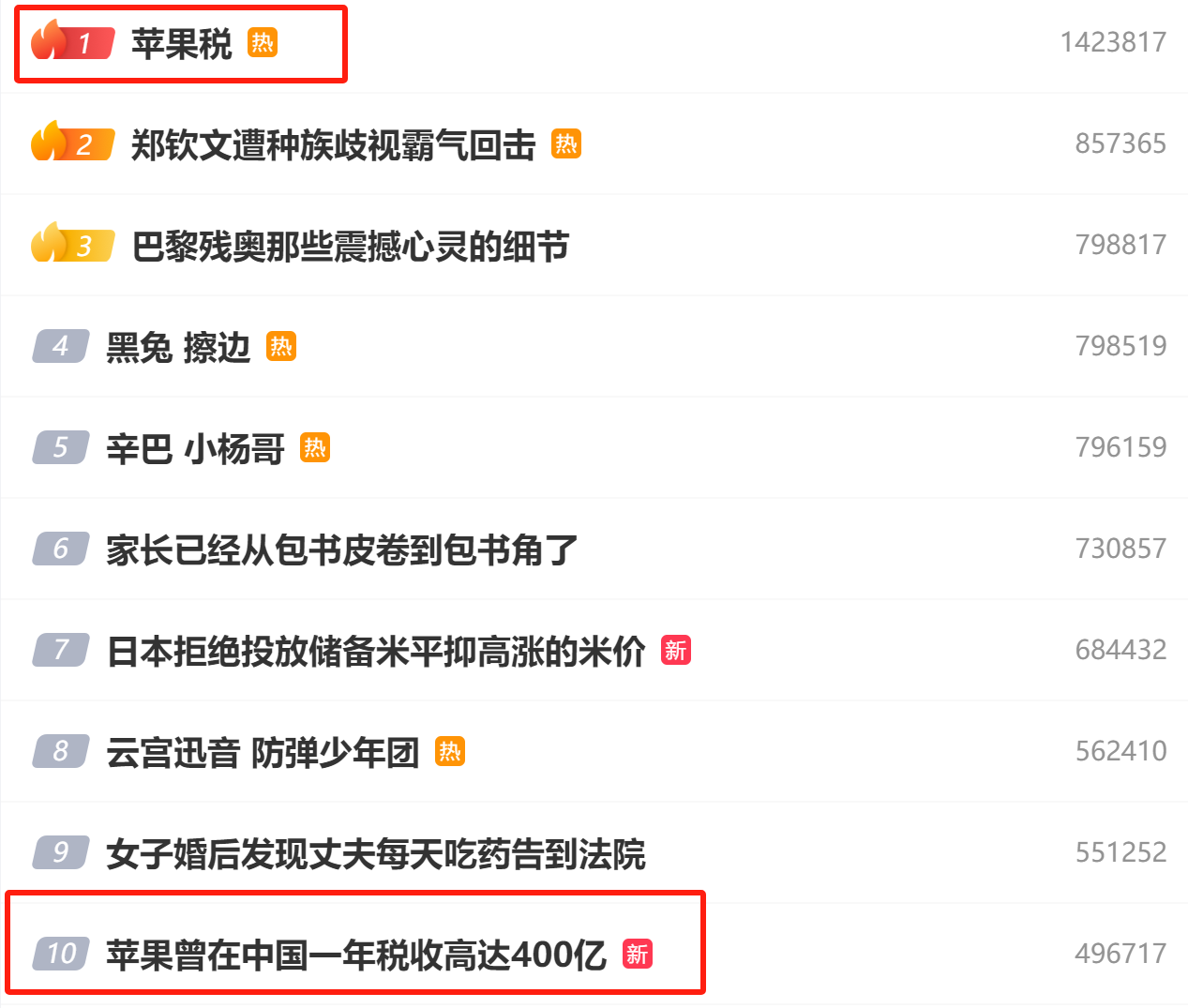
(Source: Weibo screenshot)
In response to consumer and media doubts, Apple's technical advisor recently stated that Apple and Tencent are actively communicating on related matters. Both parties will make concessions for their own benefit. Regarding whether WeChat can be downloaded and used in the future, please refer to official information. Tencent stated during the second-quarter earnings call that it is actively negotiating with Apple and hopes to achieve a win-win situation for all three parties. Cailian Press reported that it obtained information from insiders that rumors of Apple delisting WeChat are false.
Although neither Tencent nor Apple have released definitive news, as the Apple technical advisor said, it is highly likely that both parties will make concessions, and the rumor that WeChat will be delisted from the iOS platform can basically be judged as false.
The dispute between Tencent and Apple has been discussed almost every year, with cumulative answer counts exceeding 10,000 for related topics on the Zhihu platform. The rumor that WeChat will be delisted from the iOS platform has been proven false every year, but why do netizens continue to discuss it avidly?
iPhone users have long suffered from the 'Apple tax'
Around 2017, there was already a large amount of online discussion about choosing between an iPhone and WeChat. At that time, most people believed that WeChat had higher user stickiness, but many netizens still firmly supported Apple. However, under this Weibo trending topic, netizens almost unanimously support Tencent. The change in netizens' attitudes is largely due to the fact that the 'Apple tax' has tangibly affected iPhone users.
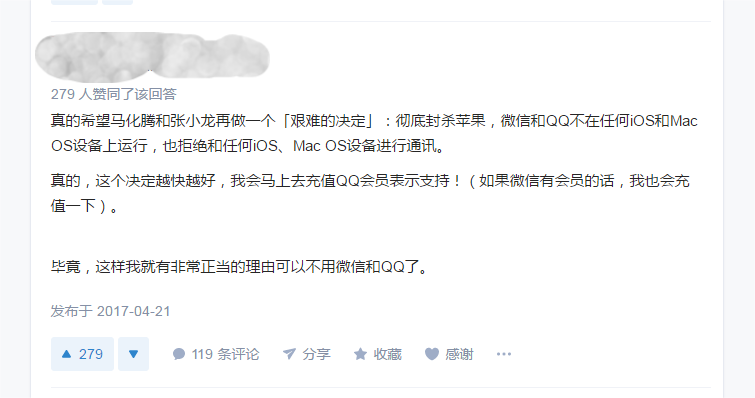
(Source: Zhihu screenshot)
For apps listed on the App Store, Apple takes a commission, which varies depending on the region and the developer's revenue scale. Currently, the domestic App Store commission rules are 15% for small developers and 30% for standard commissions, which are relatively high.
According to statistics from Sensor Tower, a third-party research firm, Apple's global revenue from the 'Apple tax' reached $22.34 billion in 2023, equivalent to approximately RMB 160 billion, with the Chinese market contributing over RMB 40 billion.
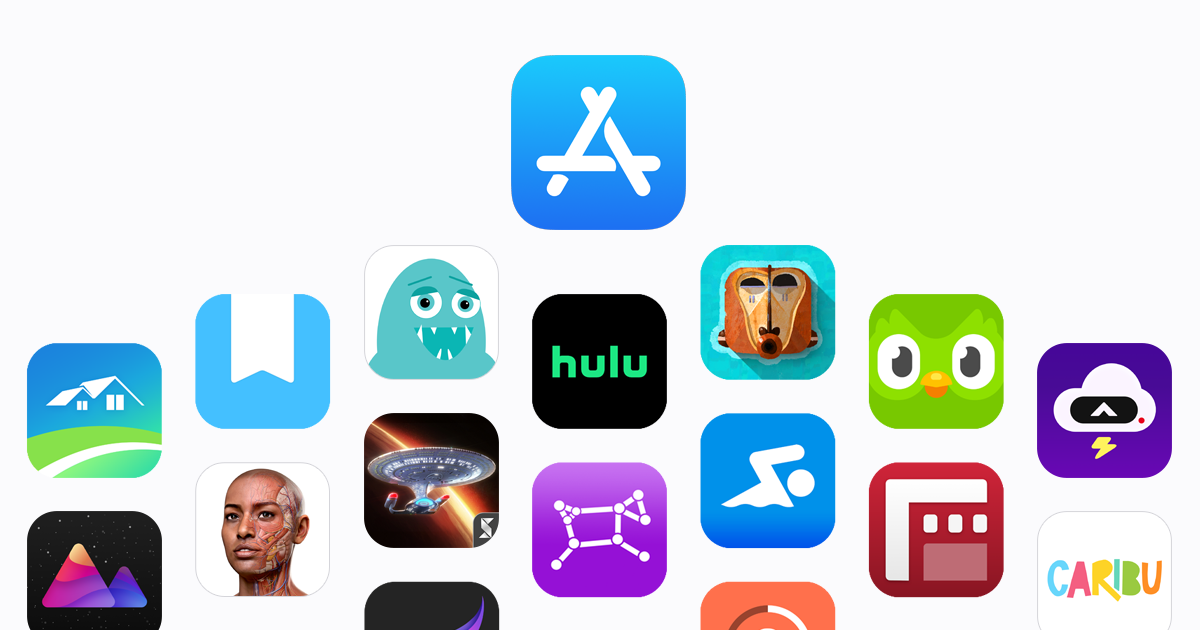
(Source: Apple)
In the past, Apple fans often defended Apple by pointing out that Android has higher commissions, but Android commissions are generally targeted at game channel servers, where the platform is responsible for game operation and maintenance and offering various benefits to attract consumers. If you don't want to play on a channel server, Android phone users can also download apps from the game's official website without any platform commission.
Apple, on the other hand, doesn't care about game operations at all and prohibits users from downloading and recharging from third-party channels. Epic Games' 'Fortnite' once bypassed Apple's in-app payment system to avoid the Apple tax, resulting in a lengthy legal battle with Apple and the game being delisted for four years. It wasn't until July this year that Epic announced that 'Fortnite' would be relisted on the iOS platform in Europe.
For apps other than games, Android phone manufacturers rarely receive commissions, and Apple is omnipresent. From subscribing to app memberships to live streaming and short video tipping, Apple takes a cut of everything. On TikTok, the world's most popular short video platform, Android users can purchase 10 diamonds for RMB 1, while Apple users can only purchase 7 diamonds. It's also common for iPhone users to pay more than Android users when subscribing to various apps.
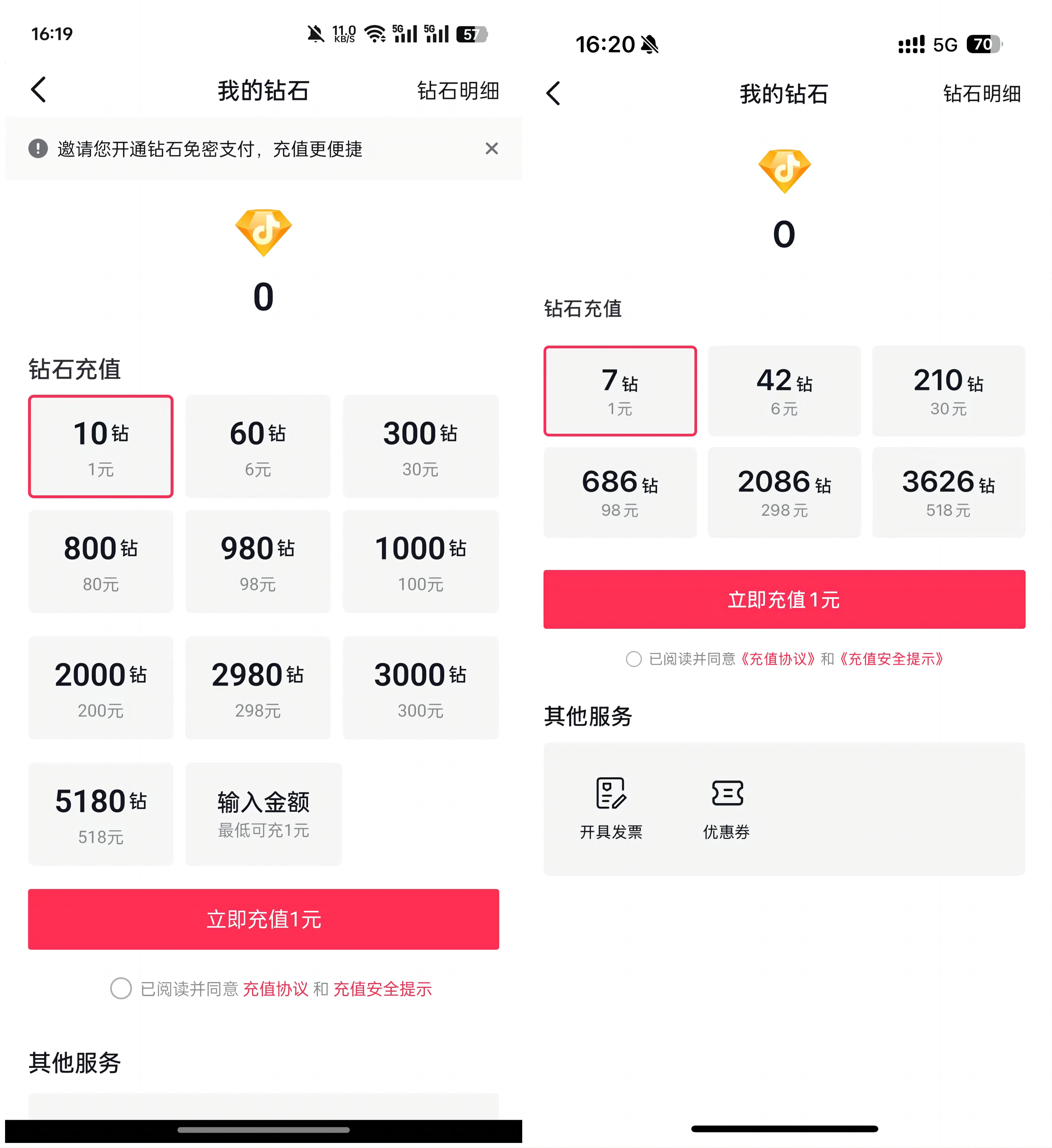
(Source: TikTok screenshot)
Under pressure from the European Union, Apple has made some concessions, such as gradually opening up sideloading of third-party apps in Europe. With funding from Epic Games, Riley Testut launched AltStore PAL, the first third-party app store on the iOS platform. However, overall, the Apple tax remains high, especially in the domestic market, where the commission rate is high and sideloading is not yet allowed.
The core of the conflict between Apple and Tencent lies in Apple's eye on the profits of WeChat mini-program games. According to the 'China Game Industry Report, January-June 2024,' the actual sales revenue of the domestic game market in the first half of this year was RMB 147.267 billion, an increase of 2.08% year-on-year. Among them, the total revenue of mini-program mobile games was RMB 16.603 billion, accounting for 11.27%, with a year-on-year growth rate of 60.5%, indicating huge market potential. WeChat is the dominant player in the mini-program game field.
Apple is eager to tap into the mini-program game market, which is why it issued a warning to Tencent. Many netizens are mini-program game players, and if Tencent compromise s to Apple, there is inevitably a risk of price increases for mini-program game recharges, leading to growing opposition.
The most likely outcome of this incident is that Tencent and Apple will each take a step back, with Apple reducing its commission rate and Tencent accepting a certain level of commission. However, forcing commissions on mini-program games or compromising with Tencent could further damage Apple's already declining influence.
Declining influence, Apple's authority fades
As opposition voices grow and supportive voices wane, Apple's influence is undoubtedly declining. Looking at revenue and profits, Apple's problems are even more apparent. Relying on its strong industrial strength, China's market differs significantly from international markets. In Apple's fiscal third quarter of this year, total revenue reached $85.777 billion, an increase of 5% year-on-year, with net income of $21.448 billion, up 7.9% year-on-year. Europe, North America, Asia-Pacific, and other regions have maintained solid growth.
Turning to the Chinese market, Apple's Greater China revenue in the third fiscal quarter was $14.728 billion, down 6.5% year-on-year. According to IDC statistics, domestic iPhone sales declined 3.1% year-on-year in the second quarter of this year, marking the first time in four years that sales have fallen out of the top five.
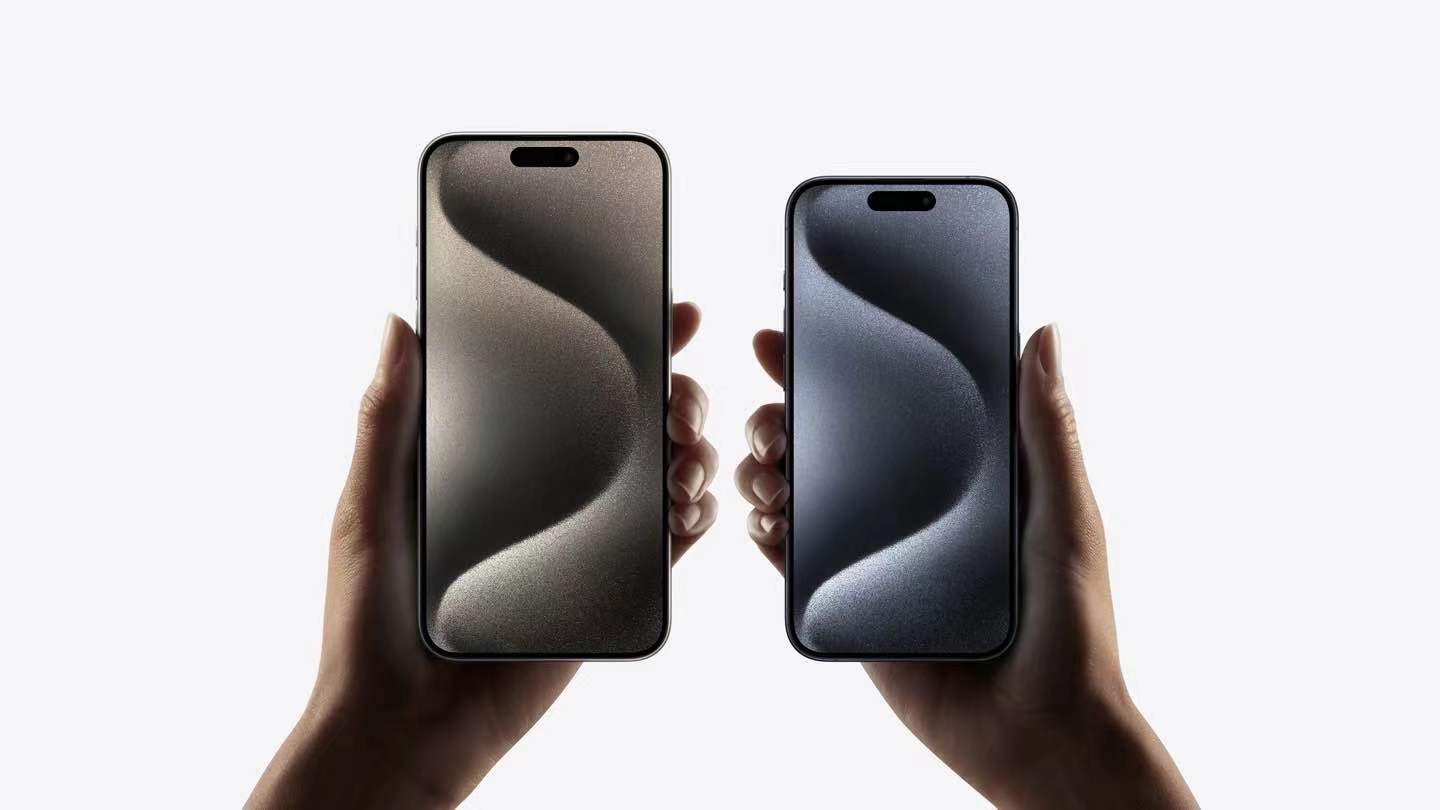
(Source: Apple)
Tim Cook himself has acknowledged that the Chinese mobile phone market is highly competitive. Huawei, OPPO, vivo, Xiaomi, and Honor are all strong players, and their products are not inferior to the iPhone in terms of performance and experience. The iOS system is no longer far ahead, and many features introduced in recent years have long been available on Android.
Amidst fierce competition, domestic mobile phones are also highly competitively priced, with ordinary flagship phones generally costing around RMB 4,000 and top-end flagships around RMB 8,000. The current starting price of the iPhone 15 series is RMB 5,999, with only 128GB of storage space, while at the same price point, domestic top-end flagships with 512GB or 1TB of storage space are available.
In the less competitive European and American markets, Apple only needs to beat Samsung's flagship phones to remain secure. However, in the Chinese market, where strong competitors abound, Apple needs to find a breakthrough, but it seems unaware of the severity of the situation.
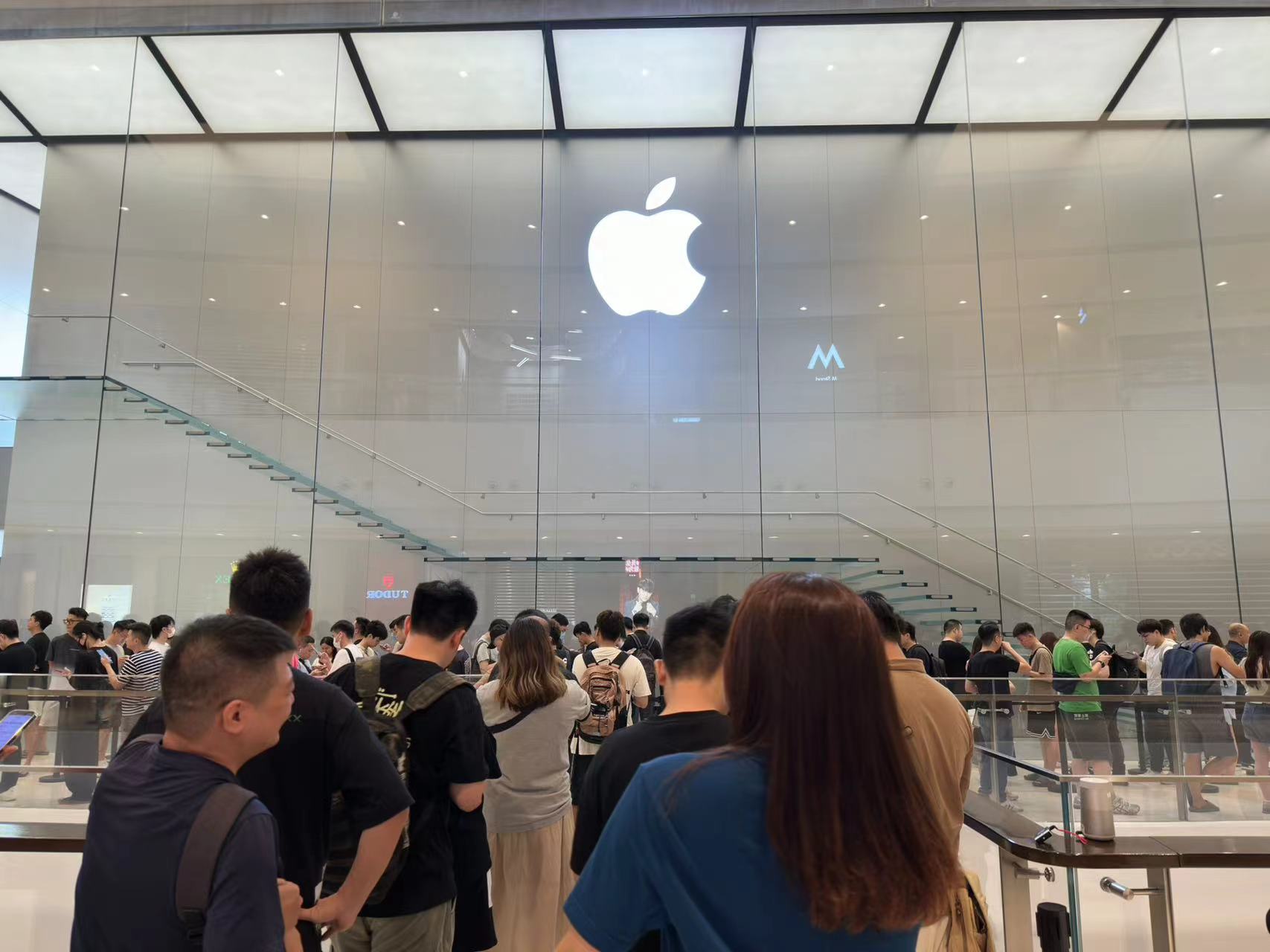
(Source: Apple)
The warning to Tencent is more like a forced revenue boost following declining iPhone sales and revenue. However, in the Chinese market, there are many phone manufacturers that can replace the iPhone, but it is difficult to find an instant messaging app that can replace WeChat. After all, it's not difficult to develop an instant messaging app; the challenge lies in getting everyone to quickly switch from WeChat to a new app. Moreover, Android users are unaffected and have no need to switch apps along with iPhone users.
If Tencent insists on not compromising or demands that Apple take a step back, it will be a significant blow to Apple's influence and could even affect iPhone 16 sales and Apple's future revenue.
iPhone 16 struggles to recreate Apple's glory
Every year, during the fourth quarter and early next year, Apple relies on its newly launched phones to top smartphone sales rankings. However, the iPhone 16 series may struggle to recreate past glories this year.
The primary reason for the potential decline in iPhone 16 sales lies in pricing. Angelo Zino, a technology analyst at CFRA Research, predicts that due to the addition of more AI features, the iPhone 16 series prices may rise across the board. The starting price of the iPhone 15 series is already as high as RMB 5,999, and if the iPhone 16 series increases further, the starting price could reach around RMB 6,499.
Apple has attempted to position the iPhone as a 'luxury product,' inviting Angela Ahrendts, former CEO of luxury company Burberry, to serve as a senior vice president at Apple. The RMB 8,388 starting price of the iPhone X was her masterpiece. However, domestic iPhone sales plummeted 22% in the fourth quarter that year, and Angela Ahrendts was forced to leave Apple in 2019.
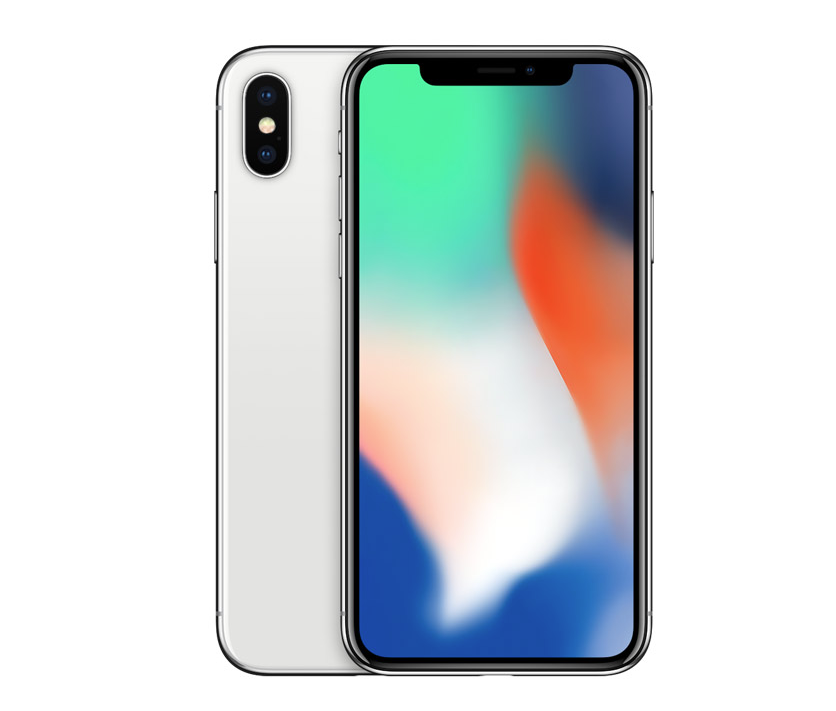
In recent years, iPhone prices have continued to rise, reminiscent of Apple's past strategies. While Android manufacturers are aiming for the high-end market, they have insisted on starting flagship phones at around RMB 4,000, giving them a pricing advantage.
Secondly, competition with Tencent may also concern some consumers about the possibility of WeChat being delisted from the iOS platform. Abstaining from purchasing the iPhone 16 series is the safest approach. Under the influence of continuous progress in Android flagships and rising iPhone prices, more and more consumers are choosing Android phones. In the long run, Apple's domestic revenue and iPhone sales are likely to continue declining.
Netizens' heated discussions about Apple and Tencent-related topics do not genuinely suggest that Apple will delist WeChat; rather, they reflect Apple's declining influence. In the domestic market, Tencent has the strength to compete with Apple, and netizens enjoy watching the drama unfold.
As the iPhone's market share continues to decline, its weight in the hearts of developers will inevitably decrease, potentially leading to more developers challenging Apple and discussing more reasonable commission rates. In Xiao Lei's opinion, Apple's top priority is not to increase revenue and profits but to enhance product competitiveness and sales by 'benefiting consumers,' thereby increasing its influence and voice.
The Apple empire created by Steve Jobs reached its peak under Tim Cook's leadership, but all dynasties eventually come to an end. Even a giant like Apple has suffered setbacks in its automotive business. With a few major decision-making errors, the dynasty could collapse. The iPhone user base remains the foundation of Apple's empire, and only by strengthening this foundation can Apple build towering structures upon it.
Source: Leitech







